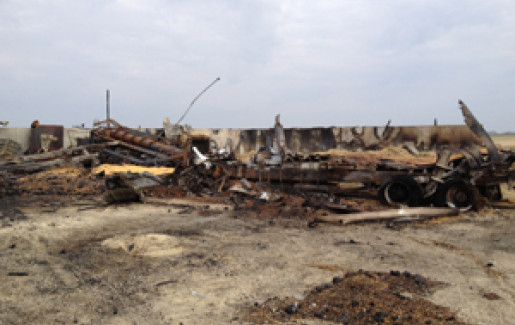Corn, Cows and Co-Insurance
On a November morning, Bill Dunlay and his wife woke up to the smell of smoke. They soon discovered that a fire, which was caused by spontaneous combustion in the hay bales, had burned down a large barn at their St. Charles, Minnesota farm.
…I really didn’t think things would be so complicated but I know now that if I hadn’t hired Globe, I would have missed out on a lot of money on my claim. …There were technicalities, like co-insurance penalties, that I never heard of and wouldn’t have known how to deal with. These penalties would have cost me money! …I recommend Globe Midwest™ Adjusters International to any farm owner or other business owner dealing with a large insurance claim. I learned that a claim is not something to go through without expert help on your side.
Description
On a November morning, Bill Dunlay and his wife woke up to the smell of smoke. They soon discovered that a fire, which was caused by spontaneous combustion in the hay bales, had burned down a large barn at their St. Charles, Minnesota farm.
After the fire, the owners promptly contacted their insurance company, and were promised a settlement that covered the cost to rebuild the damaged building. But, one obstacle still remained in their path to a full recovery. How were they to replace the contents of the building which had housed 600 bushels of corn, a year’s worth of hay and several valuable pieces of farm equipment including three tractors and a skid loader? Globe Midwest™ Adjusters International met with the Dunlays soon after the fire was out, and was hired to help the farm to get everything they were owed under the personal property/content portion of the farm’s commercial insurance policy.
Issues
The farm, which produces corn and cattle, was covered under a commercial policy that included co-insurance. Coinsurance is a property insurance provision that imposes a penalty on an insured’s loss recovery if the limit of insurance purchased is not at least equal to a specified percentage of the value of the insured building.
Dunlay Farm had a serious co-insurance problem on the business personal property because nobody had considered the fact that if he had a loss, not only was his equipment insured as business personal property, but so were the crops and cows in his field and the corn that he had in storage — which made the amount of property covered much higher than was originally estimated. Would it end up that Dunlay Farm exceeded the covered amount and would have to pay a very large fine to the insurance company from their settlement?
Solutions Applied
Policyholders commonly misunderstand the role that co-insurance plays in their policies. Co-insurance penalties are triggered when a policyholder has not purchased enough insurance to cover the value of their lost items. In this case, it made filling the claim for damaged equipment and crops especially challenging, as the expensive farm equipment and valuable corn that was being stored in the barn could have been valued at a really high price, forcing the owners to pay a co-insurance penalty.
In order to help Dunlay Farm avoid the fine, Globe Midwest™ Adjusters International’s public adjusting team made two really smart moves. As commonly happens in agriculture, Mr. Dunlay had pre-sold his crops at a certain rate and was storing them in his barn until the buyer’s requested delivery date. Therefore, based on the bill of sale, we were able to value the corn according to the price that it was pre-sold for six months before the fire instead of at the current market rate which was much higher. This made a great deal of difference in fighting the co-insurance penalty because the value of the corn had spiked in recent months.
The team then researched the price that each piece of damaged farm equipment would sell for at auction. Normally when determining the value for manufacturing equipment, the current cost of a new machine is used and then depreciation is calculated based on the age of the equipment. If this method was used, it would have significantly raised the amount of damages, and caused Dunlay Farm to have to pay a co-insurance penalty for failing to have coverage in place to cover this higher value. But, the Globe Midwest™ Adjusters International team was able to prove that the prices of the lost tractors and skid loader were selling at a much lower amount at auction.
Globe Midwest™ Adjusters International’s experts worked diligently to prove the value of the damaged contents of the barn to be within the amount of coverage that Dunlay Farm had in place for their business personal property. Through a lot of legwork and research, they were able to prove to the insurance company that the loss should be valued within their coverage limits — taking the co-insurance penalty off the table.
Outcome
After negotiating with the insurance company, Globe Midwest™ Adjusters International was able to successfully settle the business personal property claim for $310,000 — a 40% increase over the original settlement offer of $218,000. By pricing the items using the above described methods, the value of the items not damaged was kept low and the value of the total loss items was maximized to what those items could actually be replaced for, at the current market price. As the co-insurance penalty no longer applied, Dunlay Farm did not have to pay a fine to the insurance company and was able to keep the full amount of the proceeds.
Dunlay, who received the final check four months after the fire, said that having expert help from the Globe Midwest™ Adjusters International team made all the difference in helping his business recover from the devastating barn fire.

